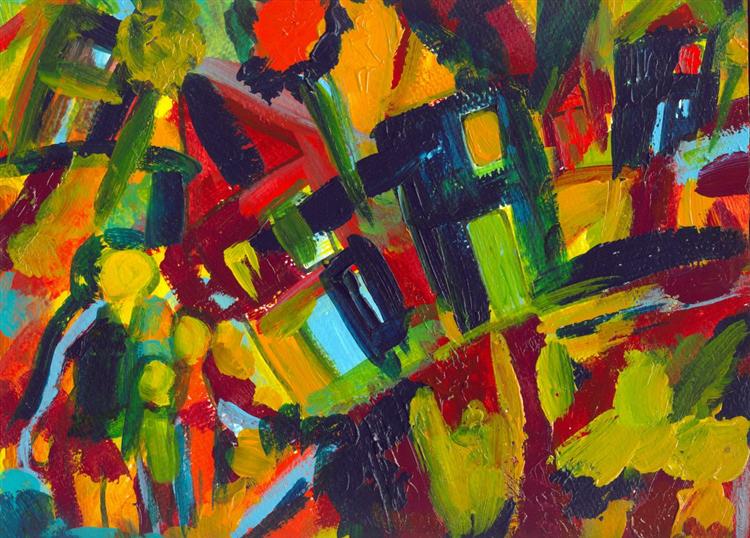Description
The painting "304 - 1910" by Wassily Kandinsky is a work that embodies not only the development of the technique and style of the author, but also the evolution of abstract art in the context of the twentieth century. Kandinsky, one of the pioneers of this technique, sought to transcend the figurative representation and explore the emotional impact of color and shape. In this piece, which is part of its fascinating corpus of works, a complex interaction of lines, shapes and colors that challenges the artistic conventions of its time is observed.
In "304 - 1910", its composition is characterized by a dynamic arrangement of elements that seem to flow and vibrate. The interaction between organic and geometric groups produces a sense of movement, as if the visual elements were in a state of perpetual conversion. This fluidity is one of Kandinsky's distinctive characteristics, who was inspired by music and wanted his art to evoke auditory experiences through sight. The work invites the spectator to immerse himself in a world in constant transformation, a principle that Kandinsky defended as essential for modern art.
The colors in the work are equally significant. The choice of vibrant dyes, along with contrasting tones, suggests intense emotions and diverse moods. Kandinsky used color not only as an aesthetic element, but as a means to express spirituality and internal emotions. In "304 - 1910", this multifaceted palette plays a crucial role in the communication of energy that the work emanates, attracting attention while managing a sense of depth and harmony. Kandinsky's color theory, in which each color has a psychological meaning, becomes evident in the synergy of tones that he chose for this painting.
Although in "304 - 1910" human figures or specific characters cannot be identified, the absence of the human form does not remain importance to the visual narrative that unfolds. On the contrary, the lack of concrete figures allows a significant expansion in the interpretation; The spectator is invited to project his own experiences and emotions in the work. This idea of the spectator's participation in the creation of the meaning of the work is one of Kandinsky's most important contributions to contemporary art.
Kandinsky, in this period, was beginning to consolidate his theory of abstraction, differentiating himself from the previous styles that still tried to adhere to the realistic representation. This work, therefore, serves as a bridge not only among its own artistic evolution, but also as a testimony of the paradigm shift in art towards new forms of expression. Influenced by currents such as expressionism and symbolism, their work begins to be an exploration field where the boundaries between the visual and the emotional merge.
In terms of context, "304 - 1910" is located within the broader work of Kandinsky and the abstract art movement that was being established at that time, particularly in Germany and Russia. Other contemporary artists, such as Piet Mondrian and Kazimir Malevich, also experimented with abstraction, each contributing their own unique vision. Kandinsky's uniqueness lies in his approach to color and his ability to channel emotions through non -representative forms.
In summary, "304 - 1910" is a work that encapsulates the essence of artistic change of the twentieth century, a time when art limits began to expand towards unpredictable. Kandinsky's exploration of form and color not only creates a fascinating visual journey, but also poses questions about the artistic perception that continue to resonate in contemporary art. It is an invitation to experience more than interpreting, to feel more than to see, remaining as one of the most significant contributions to the evolution of modern art.
KUADROS ©, a famous paint on your wall.
Hand-made oil painting reproductions, with the quality of professional artists and the distinctive seal of KUADROS ©.
Art reproduction service with satisfaction guarantee. If you are not completely satisfied with the replica of your painting, we refund your money 100%.

